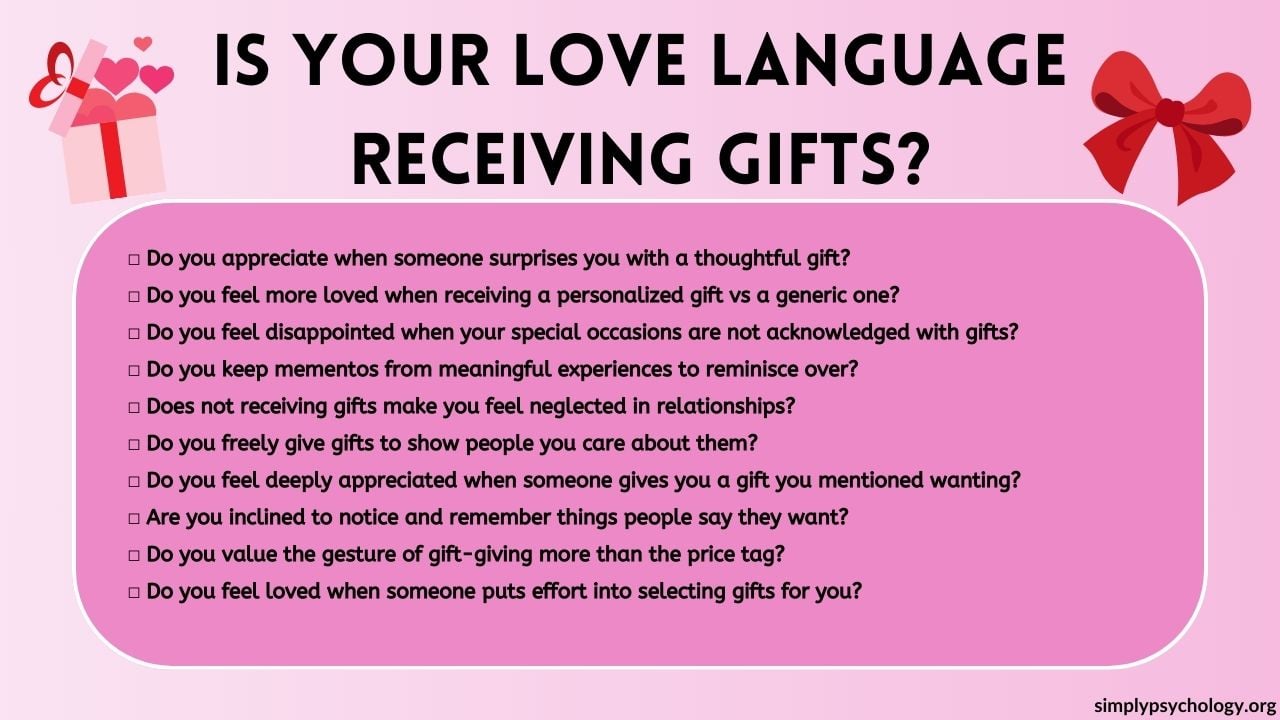Receiving Gifts” is one of Dr. Gary Chapman’s love languages, emphasizing love through tangible tokens, where the intent and sentiment behind the gift are emotionally valued by the recipient.
Dr. Chapman is a psychologist-anthropologist and the author of the book “The Five Love Languages,” published in 1992.
Love languages, as a concept, describe the ways someone expresses and receives love (Chapman, 1992). Receiving gifts specifically refers to people who either feel loved or express love the best when their partners and loved ones gift them something thoughtful, either tangible or intangible (Chapman & Chapman, (2010).

Emphasis is not so much on the item itself but more so on the symbolic meaning behind it. The gift serves as a physical manifestation of someone’s love and reflects the sentiment of care and thoughtfulness.
Such gift-giving can range from small things like getting your partner flowers because you know they like them, buying them their favorite chocolate when you are out shopping, or even surprising them with a gift during special moments.
Being generous is a key part of how people exchange and receive love through this love language in an effort to make their loved ones happy and make important times even more exceptional.
The gifts do not need to have a high price tag either or any inherent cost attached to them. Something simple such as finding a nice seashell on the beach that you think your partner would like, could make a wonderful gift to your person with this love language.
“I love when someone goes to the trouble of finding something for me. This doesn’t mean the most expensive or something incredibly rare. I said to my boyfriend that I would love that if he was just walking a lot and saw this nice leaf/flower/rock and thought to himself, “hey ___ would like that,” and just picked it up and came home to give it to me.”
‘Steph’
By receiving such thoughtful presents, emotions of connection, partnership, and love can be fostered.
Similarly, for people with this love language, it can be extra hurtful when their partner or loved ones refrain from surprising them even with small gifts or do not take the time to put thought behind their presents. This can lead to feelings of neglect and unwantedness.
Receiving gifts is not gender or age-specific (Chapman & Campbell, 2008); anyone can have a preference or disinclination for it, which can also change over time as it is not a rigid concept.
How do you know if your love language is receiving gifts?
One of the easiest ways to determine your primary love language is by taking the free quiz developed by Dr. Chapman himself (available on the five love language website). It will ask you a series of questions to help you reflect on your preferences and what is most meaningful to you.

Additionally, there are a few things you can reflect on yourself to help you decide if receiving gifts is your love language. You could ask yourself the following questions:
- Do you feel more loved when you receive gifts regardless of their size and price tag?
- Do you appreciate a thoughtful gift more than other forms of displaying love, such as physical touches?
- If there is minimal thought behind a gift or an overall lack of gifts in general from your loved one, does that make you feel more neglected and unloved?
- Do you keep souvenirs or tokens from your time spent with others (e.g., concert tickets)?
If you answered mainly yes to these questions, then receiving gifts is likely one of your primary love languages. This means that you feel connected and cared for in your relationships when someone takes the time and presents you with a thoughtful gift.
Many people unconsciously use their preferred love language to showcase their emotions to someone, as that is how expressing care comes the most naturally to them. Hence, you may also be someone who enjoys giving gifts to others.
For example, you may be someone who enjoys surprising your loved ones with gifts, you spend extra time and care when picking out personalized items for people, or you may remember if someone mentions they have wanted something and you buy it for them as a present.

How do you show love to someone whose love language is receiving gifts?
If your loved one has receiving gifts as their love language, then it is important to incorporate acts of gift-giving into your relationship. This will ensure that you are showcasing your love in a manner your partner will understand and receive the best.
General principles
There are a few general principles to keep in mind when it comes to showing a partner love in this way.
Pay attention during your interactions together. Keep a look out for cues around their preferences and what they do not like. If they mention thinking about an item or wanting it, make a mental note.
Personalize your gifts, and do not rely on general items. For example, gifting them their favorite perfume vs. a gift card will have a big difference. Ensure you are putting thought behind your gesture and are not buying them something just to “tick a box.”
“I enjoy any form of gift-giving, but I don’t feel as fulfilled when someone just tells me what they want or, worse yet, they want me to just get them a gift card. I’m still happy to do it, but I want there to be a lot of thought and sentiment into what I’m giving.”
‘Alex’
Do not solely focus on luxury items either. Interestingly, research has indicated higher satisfaction if the gift has a specific use for the recipient rather than how impressive they think it looks upon opening (Galak, Givi & Williams, 2016).
It might help to think about your gift as a physical manifestation of your feelings for your partner. So truly make your gifts person-centered.
Remain consistent. Remember that this is not a one-off thing, but this is how your partner receives love and feels cared for in your relationship.
Try and incorporate small acts of gift-giving throughout your weekly routine. It is not about the grandiosity of the gesture but more so the fact that you have put time and effort into thinking about your partner.
“It’s the small things that matter. Yes, you could give me money for me to get what I like, but where’s the connection or the thoughtfulness in it? You can give money all day long without a care in the world. But a gift? You have to put thought into it.”
‘Roberta’
Lastly, if you say you will gift them something, stay true to your word.

Examples
Ultimately, this will come down to your partner’s preferences and what they enjoy receiving, but here are some examples of showing someone love and affection through gift-giving to get you started:
- Surprise them with food or dessert from their favorite restaurant.
- Plan a thoughtful vacation to a location that you know they have wanted to go
- Put together a photo album with a collection of either your favorite pictures of them or some of your favorite moments that you have shared together. This could be a physical album or even a virtual photo collage; think about what your partner would appreciate the most.
- Gift them a sentimental piece of jewelry. For example, it could be a family heirloom, their favorite stone, or a piece with a symbol/design that has a special meaning in your connection.
- Gift them their favorite book or a book you think they will like, and write a sweet message on the foreword page. You can even highlight your favorite passages from the book to make it extra special.
How to express to your partner that your love language is receiving gifts
If receiving gifts is one of your primary love languages and you are wondering how to express this to your partner, there are a few things you can do.
Firstly, reflect on what it is that you need. Each person is unique in their preferences, so what one person enjoys receiving might be completely opposite to what someone else prefers.
Thinking about your wants, dislikes, and reasons why will make it much easier to articulate to your partner and express why receiving gifts is important to you. The more specific, the better and easier this will be for your partner.
Secondly, as soon as you find a suitable time and place, e.g., when you are both relaxed and at home, have an honest discussion with them. Communication is key, so it is important that you are direct and clear about your love for receiving gifts.
It will also help if you give some examples of types of gifts and gestures that make you feel the most cherished. Feel free to share past experiences of receiving a gift and walk your partner through the emotions of love and appreciation you experienced.
Lastly, establish expectations and try to meet them in the middle. If your partner is not used to expressing their love this way, then it might take some time before they can properly incorporate this into your relationship.
A simple but powerful thing you can do is to give positive cues and show your appreciation when they do give you a gift. This will help reinforce the importance of their gesture to you.
Have regular check-ins with them and maintain an open dialogue to ensure both of your needs are met.
Frequently asked questions
Is it bad if my love language is receiving gifts?
It is absolutely not bad if your love language is receiving gifts. Despite the common misconception that a person with this love language must be either shallow or materialistic, this could not be further from the truth.
The intrinsic value is held in the notion that someone has taken their time and put in the effort to select a special item for you. It symbolizes the physical manifestation of someone’s love and affection toward you.
Each person is unique in how they understand, perceive, and feel love, so it is important to remember that there is no good or bad love language. Some may enjoy more physical touches, while others prefer to hear how much their partner cares for them verbally.
Each love language has its place and value, and there is no shame in identifying with any of them. It all comes down to personal preference and how your love style can merge and complement the love styles of the people close to you.
Ensure you openly communicate about your preferences so each person’s love languages are honored in the relationship.
Do people with this love language also express love by giving gifts?
It is highly likely that people with this love language also express love by giving gifts.
Oftentimes, people use their preferred love language to convey their own affection to those they care about, as that is how they best perceive and understand love. However, we are all diverse in our preferences, and that does not always have to be the case.
Someone may prefer receiving gifts but feel more comfortable displaying their love in another way, e.g., acts of service. This can also fluctuate depending on the type of connection.
For example, someone may have received gifts as a love language for their platonic friendships but may prefer quality time for their romantic ones.
How can you show yourself love through receiving gifts?
Receiving gifts does not only have to come from external sources, but you can show yourself some love through this love language. You may especially enjoy this if gift-giving is one of your preferred methods of showing love to others.
This can range from small acts such as buying yourself flowers or takeaway from your favorite restaurant to gifting yourself a nice item that you have been wanting for some time.
Another great starting point is having a self-care day by booking a spa appointment or even doing a facial at home.
Lastly, if you enjoy traveling, book yourself a staycation, a trip abroad, or even go on an adventure and cross something off your bucket list.
Reflect on what you enjoy the most, and give yourself some love and kindness by taking time to enjoy yourself.
What should you avoid if your partner’s love language is receiving gifts?
If your partner’s love language is receiving gifts, then there are a few things you should avoid. Firstly, not tailoring your gift to your partner but instead giving them generic thoughtless gifts.
A big component of why your partner feels loved through gifts is the thought and time you put behind it. Ensure your gifts have a certain level of meaning behind them.
Do not forget anniversaries or special occasions, as such events have higher emotional importance to your partner.
Lastly, do not use gifts as a scapegoat for problems in your behavior or relationship. Address any issues directly and do not rely on the gift to mask the problem, as this can only exacerbate the problem down the line.
References
Chapman, G. D. (1992). The five love languages. Northfield Pub.
Chapman, G., & Campbell, R. (2008). The five love languages of children. Moody Publishers.
Chapman, G. D., & Chapman, G. (2010). The five love languages: The secret to love that lasts. Northfield Pub.
Galak, J., Givi, J., & Williams, E. F. (2016). Why certain gifts are great to give but not to get: A framework for understanding errors in gift giving. Current Directions in Psychological Science, 25(6), 380-385.


